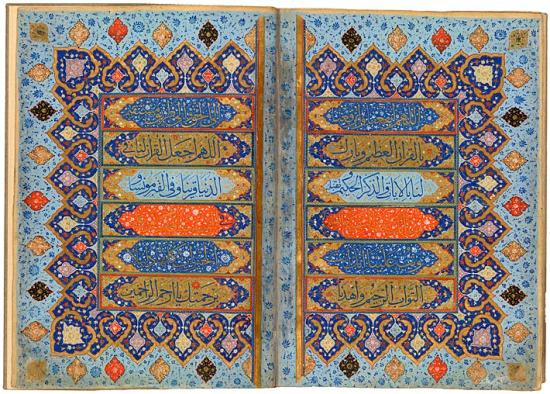
Closing Prayer in the Jerrāḥ Pasha Qur˒an
Qur˒an, in Arabic
Purchased by Pierpont Morgan, before 1913
This is the first of two pairs of elaborately ornamental facing pages that appear at the end of the Jerrāḥ Pasha Qur˒an, made in Shiraz about 1580. It enshrines a prayer written in twelve lines: Oh God, profit us and raise us through the magnificent Qur˒an, and bless us and accept the verses [we read] and the wise repetition [we make]... Turn toward us, for You are the Merciful One Who accepts the penitent, and guide us to the truth and to a straight path. Oh God, make for us the Qur˒an a constant companion in this world, a consoler to the grave, and... a guide for all good works, through Your mercy, oh Most Merciful.
The Qur˒an, the Holy Book of Islam
From a monumental volume used in an Istanbul mosque to a miniature Persian version that served as a talisman, this section features examples of illuminated pages from the holy book of Islam. The Qur˒an (to recite) represents the codification of the words of God that were revealed and transmitted through the angel Gabriel to the prophet Muḥammad (ca. 570–632) over a period of twenty-three years. The visions began in 610 in a cave on Mount Hira near Mecca, his birthplace, and continued after his 622 flight to Medina, until his death. His flight—the Hijra—marks the beginning of the Islamic calendar.
The revelations were arranged into 114 suras (chapters), each named after its theme. The first and shortest ones, at the end of the book, from the Meccan period, establish Muḥammad as the final prophet in a line of monotheists, including Abraham and Jesus. The longest suras, placed at the beginning, are Medinan and deal more with social and political issues.
For centuries, Qur˒ans were written in Arabic, the language of transmission. After Muḥammad's death, his cousin ˓Alī and others compiled the revelations into a text. About twenty years later, under Uthman, the third caliph (644–656) succeeding Muḥammad, a standard version of the Qur˒an —essentially the one used today—was produced. Thereafter Islam (which means "surrender to God") spread from the Arabian Peninsula throughout the Middle East, to northern Africa and southern Spain, and eventually the world.
